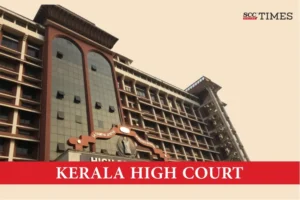Kerala High Court: While deciding a petition under Section 482 of the Code of Criminal Procedure, 1973 (‘CrPC’), challenging an order of the Additional District & Sessions Court (For the trial of cases relating to Atrocities & Sexual Violence against Women and Children), (‘Sessions Court’) for alteration of charges framed, t Bechu Kurian Thomas, J., observed that alteration or addition of charges must be based on the Court’s satisfaction and not on a party’s application.
Background
The present case relates to a petition filed by the State, challenging an order of the Sessions Court. The petition was filed under Section 482 of the CrPC, seeking to alter the charges already framed by incorporating an additional offence under Section 370 of the Penal Code, 1860 (‘IPC’).
In 2006, the accused promised the victims to provide cleaning jobs at a Hospital in Dubai. After reaching Dubai, they were confined in an apartment and were served with a beverage containing intoxicating substances and were repeatedly raped. The victims were forcibly taken to other apartments and, after wrongly confining them, were compelled to have sexual intercourse with several strangers. Upon escaping with the assistance of the Indian Embassy and returning to India, they lodged an FIR. Following the investigation, the final report charged the accused under Sections 420 (cheating), 376 (rape), and 342 (wrongful confinement) read with Section 120-B (criminal conspiracy) of the IPC.
After the trial commenced and the testimonies of the victims were recorded, the prosecution filed an application under Section 216 CrPC, seeking to add Section 370 IPC to the charges. The Sessions Judge dismissed this application, reasoning that Section 370 IPC, pertaining to the trafficking of persons, was incorporated into IPC by the Criminal Law (Amendment) Act of 2013, which came into effect on 3-02-2013. Since the alleged offenses occurred in 2006, the provision was deemed inapplicable. This dismissal led to the current petition under Section 482 CrPC.
The prosecution contended that the evidence indicated the elements of trafficking, justifying the addition of Section 370 IPC, as it stood before the 2013 amendment.
Decision and Analysis
The Court examined the definition of slavery as implied in Section 370 IPC before its amendment, which criminalized the buying, selling, or disposing of any person as a slave.
The Court referred to the decision in Dhanurjaya Putel v. State of Orissa, 2002 SCC OnLine Ori 225, which interpreted slavery as the deprivation of freedom of movement and the right of expression concerning a person or property, and said that this supported the prosecution’s claim that the accused’s actions constituted slavery under the pre-2013 Section 370 IPC.
However, despite agreeing with the prosecution’s interpretation, the Court noted that the power to alter charges under Section 216 CrPC lies exclusively with the Court and cannot be invoked through an application by any party. The Court further referred to the Supreme Court’s decision in P. Kartikalakshmi v. Sri Ganesh, (2017) 3 SCC 347, and noted that alteration or addition of charges must be based on the Court’s satisfaction and not on a party’s application.
Consequently, the Court dismissed the petition and upheld the impugned order, noting that the same was not due to the reasons stated by the Sessions Judge, but because the application by the prosecution to alter the charges was procedurally improper. The Court emphasized that while the prosecution’s application could not be entertained, the Trial Court retained the discretion to independently alter or add charges if it deemed necessary based on the evidence presented.
[State of Kerala v. Azeez, 2024 SCC OnLine Ker 2059, Order dated 12-04-2024]
Advocates who appeared in this case :
Advocate for the State: M.C. Ashi, Public Prosecutor
Advocate for the Respondents: I.V. PRAMOD, Ashik K. Mohammed Ali, Jessy George, K.V. Sasidharan, P. K. Jayasreethankachi, Saira Souraj P.

